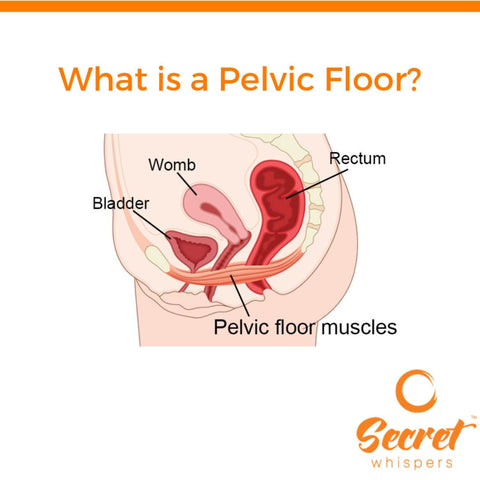How Your Weight Can Impact Your Pelvic Floor

When it comes to women's health, understanding the relationship between weight and the pelvic floor is crucial.
The pelvic floor, a group of muscles and tissues that support the bladder, uterus, and bowels, plays a vital role in maintaining continence and overall pelvic health.
However, weight fluctuations, particularly being underweight or overweight, can have a significant impact on the strength and functionality of the pelvic floor. In this article, we will explore the effects of obesity on pelvic floor dysfunction, the potential benefits of weight loss, and provide recommendations for maintaining a healthy pelvic floor.
Although obesity is commonly associated with pelvic floor dysfunction, it's important to acknowledge that being underweight can also have implications for pelvic floor health. Women who are significantly underweight may experience weakened pelvic floor muscles, which can lead to issues such as stress urinary incontinence, decreased pelvic organ support, and diminished overall pelvic floor strength.
Obesity and Pelvic Floor Dysfunction

Carrying excess weight, can contribute to various pelvic floor issues. The increased pressure caused by excessive body weight can weaken the pelvic floor muscles, leading to conditions such as urinary incontinence, fecal incontinence, and pelvic organ prolapse.
These conditions can cause leakage, discomfort, and a significant decrease in the quality of life for affected individuals.
Obesity-related pelvic floor dysfunction occurs when the weight places undue strain on the muscles and ligaments that support the pelvic organs.
The pelvic floor muscles become stretched and weakened, making them less effective at maintaining continence and providing support.
This weakening can result in bladder leaks, difficulty controlling bowel movements, and even the descent of pelvic organs through the pelvic floor muscles.
Does Losing Weight Help the Pelvic Floor?
If you are currently overweight or obese, shedding excess pounds may alleviate pressure on your pelvic floor and potentially prevent or alleviate pelvic floor dysfunction. Weight loss can reduce the strain on the pelvic floor muscles, allowing them to regain strength and function more effectively.
Studies have shown that even a modest weight loss of 5-10% can significantly improve pelvic floor symptoms.
Losing weight through a combination of healthy eating habits and regular exercise can have a positive impact on pelvic floor health. It's important to note that weight loss alone may not be a complete solution, and additional pelvic floor exercises are often recommended to strengthen the muscles and provide optimal support.
Our Recommendations
If you are overweight and struggling with pelvic floor issues, here are some recommendations to support your pelvic floor health:
-
Maintain a Healthy Weight: Aim for gradual and sustainable weight loss through a balanced diet and regular physical activity. Consult with a healthcare professional or a registered dietitian to create a personalized plan that suits your specific needs.
-
Pelvic Floor Exercises: Engaging in targeted pelvic floor exercises, such as Kegels, can help strengthen the muscles that support the pelvic organs. These exercises involve contracting and releasing the pelvic floor muscles and can be done discreetly at any time. Our Pelvic Floor Toner can help you learn how to do these exercises correctly and get maximum results.
-
Manage Chronic Constipation: Chronic constipation can strain the pelvic floor muscles and contribute to pelvic floor dysfunction. Ensure you consume a fiber-rich diet, stay physically active, and address any underlying digestive issues to promote regular bowel movements and learn how to reduce strain on the pelvic floor using a footstool.
-
Stay Hydrated: Drinking an adequate amount of water is essential for overall health, including the health of your pelvic floor. Proper hydration helps maintain the elasticity of tissues and supports normal bladder function.
Taking care of your pelvic floor health is essential for overall well-being. By understanding the impact of weight on the pelvic floor and implementing lifestyle changes, you can improve symptoms and prevent further complications. For additional resources and information, check out the following :
- Pelvic Floor Toner for Women
- Your 4-Week Pelvic Floor Workout Programme
- The 30-Day Pelvic Floor Challenge - Sign Up
For more articles related to pelvic floor health, diet, exercise, and related topics, explore our other blogs:
- Pelvic Floor Diet: Foods to Improve Pelvic Health
- Pelvic Floor Diet: Foods to Avoid with Pelvic Floor Dysfunction
- Pelvic Floor and Back Pain: Understanding the Connection
For any questions or further assistance, feel free to reach out to us. Your pelvic floor health matters, and we're here to support you on your journey to well-being.
Never miss another blog again. Sign up now to our weekly Newsletter. You will get a 10% discount code to use too. Just click below ⬇️⬇️⬇️











